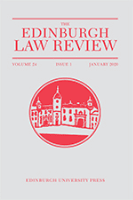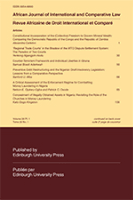
UNIVERSITY OF NEW SOUTH WALES LAW JOURNAL
Scope & Guideline
Exploring the Intersection of Law, Philosophy, and Society
Introduction
Aims and Scopes
- Human Rights and Social Justice:
A core focus is on human rights law, with numerous articles addressing issues such as Indigenous rights, refugee protections, and the implications of legal frameworks on marginalized communities. - Legal Accountability and Governance:
The journal consistently explores themes of accountability within various sectors, including police, corporate governance, and public health, emphasizing the need for oversight and reform in legal practices. - Regulatory Frameworks and Law Reform:
It examines the complexities of regulatory laws, often advocating for reforms in areas such as employment law, consumer protection, and environmental law, reflecting a commitment to adapting legal structures to contemporary challenges. - Intersection of Law and Technology:
The journal addresses the implications of emerging technologies on legal frameworks, including issues related to privacy, digital rights, and regulatory responses to technological advancements. - Comparative Legal Studies:
The journal frequently engages in comparative analyses, drawing lessons from international legal systems and practices to inform Australian law, particularly in areas like human rights, environmental law, and corporate governance.
Trending and Emerging
- Indigenous Rights and Recognition:
There is an increasing focus on Indigenous rights, treaty-making processes, and the legal recognition of First Nations, highlighting a growing awareness and advocacy for social justice and equity. - Public Health Law and Policy:
The COVID-19 pandemic has catalyzed a surge in discussions around public health law, with a focus on the legality of health mandates, emergency powers, and the implications of health policy on individual rights. - Environmental Law and Climate Justice:
Emerging themes in environmental law, particularly related to climate change, sustainability, and corporate responsibility, are becoming prominent as the legal community grapples with urgent global challenges. - Technology and Privacy Law:
The implications of technology on privacy rights and regulatory frameworks are increasingly highlighted, reflecting societal concerns over data protection, surveillance, and the ethical use of technology. - Intersectionality in Law:
A growing trend towards examining intersectional issues within legal frameworks, particularly related to gender, race, and socio-economic status, is evident, underscoring the journal's commitment to inclusive legal discourse.
Declining or Waning
- Traditional Property Law Issues:
There has been a noticeable decrease in articles focused on traditional property law, suggesting a shift towards more pressing contemporary legal issues such as human rights and technological impacts. - Conventional Corporate Law:
The focus on conventional corporate law topics appears to be waning, as the journal increasingly prioritizes discussions around corporate accountability and ethical governance rather than standard corporate structures. - General Criminal Law Topics:
While specific criminal justice issues remain relevant, broader discussions on conventional criminal law have decreased, possibly overshadowed by more targeted analyses of police accountability and systemic reform. - Historical Legal Analyses:
There seems to be less emphasis on historical perspectives of law, as recent publications prioritize current legal challenges and reforms over retrospective analyses. - Theoretical Legal Frameworks:
A decline in papers dedicated solely to theoretical explorations of law indicates a trend towards pragmatic, real-world applications of legal principles rather than abstract legal theory.
Similar Journals

A&C-Revista de Direito Administrativo & Constitucional
Pioneering Research in Administrative and Constitutional LawA&C-Revista de Direito Administrativo & Constitucional is a leading academic journal dedicated to the dynamic fields of Administrative and Constitutional Law. Published by EDITORA FORUM in Brazil, this journal has gained recognition for its rigorous peer-reviewed articles and its pivotal role in advancing legal scholarship. With its ISSN 1516-3210 and E-ISSN 1984-4182, A&C prioritizes high-quality research and discourse in law, consistently providing a forum for innovative ideas and critical analyses. The journal enjoys a notable Q1 ranking in the Law category as of 2023, reflecting its significant impact within the academic community. Spanning the converged years from 2019 to 2024, it serves as an essential resource for researchers, practitioners, and students eager to explore the evolving challenges and developments in the legal landscape. Although the journal is not Open Access, it remains committed to disseminating legal knowledge and enhancing academic collaboration within Brazil and beyond.

UNIVERSITY OF TORONTO LAW JOURNAL
Exploring Contemporary Legal ChallengesUNIVERSITY OF TORONTO LAW JOURNAL, published by University of Toronto Press Inc, stands as a distinguished platform in the realm of legal scholarship, having served the academic community since its inception. With an ISSN of 0042-0220 and an E-ISSN of 1710-1174, this quarterly journal is not only recognized for its rigorous peer-review process but also boasts an impressive Q2 rank in Law and a Q3 rank in Sociology and Political Science as per the 2023 category quartiles. The journal aims to foster advanced knowledge and discourse on various legal issues, thereby appealing to researchers, professionals, and students alike who are eager to engage with contemporary legal debates. It is noteworthy that the journal currently does not offer open access, ensuring the integrity and quality of its publications for a subscribed audience. Published in Canada and available for a wide readership, the UNIVERSITY OF TORONTO LAW JOURNAL continues to be a pivotal source for critical analyses and fresh insights in the fields of law and social sciences, contributing significantly to the understanding and evolution of legal frameworks.

Revista Chilena de Derecho
Driving Excellence in Legal ScholarshipRevista Chilena de Derecho, published by the esteemed Pontificia Universidad Católica de Chile, stands as a leading academic journal in the field of law, holding a prestigious Q1 ranking in the 2023 category classification. With its ISSN 0718-3437, the journal has been pivotal in advancing legal scholarship from its establishment in 2007 to the present. Located in Santiago, Chile, the journal serves a diverse audience of researchers, legal practitioners, and students dedicated to understanding the complexities of legal frameworks both in Chile and globally. Although the journal currently does not offer open access, its rigorous peer-review process ensures that each publication contributes significantly to legal discourse and research. With a commitment to fostering innovative ideas within the legal community, Revista Chilena de Derecho is not only a repository of knowledge but also a catalyst for scholarly debate and professional growth.

De Jure Law Journal
Enriching Legal Dialogue Across Borders.De Jure Law Journal, published by Pretoria University Law Press, is a reputable open access journal that has been serving the legal community since its establishment in 2011. With its commitment to disseminating high-quality research, this journal focuses on various aspects of law and legal principles, encompassing a broad range of topics from constitutional law to international legal frameworks. The journal's ISSN 1466-3597 and E-ISSN 2225-7160 ensure that it is easily accessible and widely recognized in academic circles. Positioned as a significant contributor to legal scholarship in South Africa and beyond, De Jure Law Journal is dedicated to fostering a critical dialogue among researchers, practitioners, and students alike, making it an essential resource for anyone engaged in legal studies.

UNIVERSITY OF CHICAGO LAW REVIEW
Exploring the Frontiers of Legal Research and TheoryUniversity of Chicago Law Review is a prestigious academic journal dedicated to advancing legal scholarship, published by the University of Chicago Law School. Renowned for its rigorous peer-review process and high editorial standards, this journal is recognized as a leader in the field of law, achieving a Q1 ranking in the 2023 category of Law and occupying a notable position within the Scopus rankings, specifically at #199 out of 1025 in the Social Sciences - Law category, placing it in the 80th percentile. The journal provides an essential platform for legal scholars, practitioners, and students to engage with cutting-edge research and theory across various legal disciplines, including constitutional law, criminal law, and comparative law. With a commitment to fostering critical discourse, the University of Chicago Law Review has been instrumental in shaping legal thought, making it a vital resource for anyone seeking to contribute to or understand the evolving landscape of legal studies. Although it does not currently offer open access, subscription options provide robust access to its extensive archive of scholarly articles since its inception.

Edinburgh Law Review
Elevating academic standards in the study of law and history.Edinburgh Law Review is a distinguished journal published by Edinburgh University Press, dedicated to advancing discourse in the realm of law, cultural studies, and history. With its ISSN 1364-9809 and E-ISSN 1755-1692, this journal has been contributing valuable scholarly content since its inception in 1997, and it continues to be a vital resource for researchers, legal practitioners, and students alike. Although it currently does not provide Open Access options, the journal's rigorous peer-review process ensures that each article meets the highest academic standards. Known for its diverse range of topics, the Edinburgh Law Review holds a Q4 ranking within its categories in Cultural Studies, History, and Law in 2023, reflecting a commitment to engaging with contemporary issues in these fields. With a noticeable presence in Scopus rankings, this journal is essential for those seeking to deepen their understanding of the intersections of law, culture, and history within a British context.

SOUTHERN CALIFORNIA LAW REVIEW
Advancing Legal Scholarship Since 1973Southern California Law Review is a prestigious academic journal published by the University of Southern California, focusing on the expansive field of law. With an ISSN of 0038-3910 and a continuous publication record since 1973, this journal has established itself as a vital platform for legal scholarship and discourse. It holds an impressive Q1 ranking in the law category for 2023 among academic journals, reflecting its significant impact and reputation within the legal community. The journal encompasses a wide array of topics designed to foster rigorous debate and critical analysis, making it a crucial resource for researchers, practitioners, and students alike. Although currently not open access, it consistently aims to provide in-depth scholarly articles that contribute to the development and understanding of law across various dimensions. As it continues to evolve until 2024, Southern California Law Review remains an essential resource for anyone committed to exploring the nuances of legal theory and practice.

DUKE LAW JOURNAL
Empowering scholars, practitioners, and students alike.DUKE LAW JOURNAL is a premier scholarly journal published by Duke University, dedicated to advancing the field of law through rigorous research and critical analysis. With an ISSN of 0012-7086 and an E-ISSN of 1939-9111, this distinguished journal has established itself as a vital resource for legal scholars, practitioners, and students alike. As a member of the top quartile (Q1) in Law for 2023 and ranking 267 out of 1025 in the Scopus database, the journal showcases high-impact articles that contribute to the contemporary discourse on legal theory, practice, and reform. While it does not currently offer open access, its rich archive since 1978 provides invaluable insights into significant legal developments in the United States and beyond. The DUKE LAW JOURNAL serves not only as a repository of knowledge but also as a forum for diverse perspectives, making it an essential tool for anyone engaged in the legal profession or academia.

Revista Boliviana de Derecho
Exploring Legal Frontiers in Bolivia and BeyondRevista Boliviana de Derecho is a prominent academic journal dedicated to the exploration and dissemination of legal studies, particularly focusing on the issues pertinent to Bolivia and Latin America. Published by Inst Derecho Iberoamericano, this journal serves as a vital platform for researchers, legal professionals, and students to engage with contemporary legal theories and practices. With its ISSN 2070-8157 and E-ISSN 2706-8080, the journal adheres to high academic standards and aims to contribute significantly to the advancement of legal scholarship in the Spanish-speaking world. Although it operates within a closed access framework, its publications are crucial for understanding the evolution of legal frameworks and their implications in a rapidly changing society. By providing a convergence of diverse legal opinions and analyses, Revista Boliviana de Derecho remains an essential resource for anyone invested in the field of law.

African Journal of International and Comparative Law
Exploring International Perspectives on African Legal IssuesAfrican Journal of International and Comparative Law is a distinguished publication that serves as a vital forum for scholarly discourse in the fields of international and comparative law, with a specific focus on legal issues pertinent to the African continent. Published by Edinburgh University Press, this journal boasts a respectable impact factor and finds its reputation bolstered by its strategic ranking within the Q3 category of law, according to Scopus metrics, where it occupies the 681st rank out of 1025 journals. Although it does not currently offer open access, the journal remains committed to fostering legal scholarship and providing critical insights that bridge the gap between theory and practice. The journal's coverage encompasses scholarly articles, case studies, and analyses of contemporary legal challenges from 2005 to 2024, making it an indispensable resource for researchers, practitioners, and students dedicated to advancing their understanding of international and comparative legal frameworks in the African context. The editorial team encourages submissions that contribute to the dialogue on legal reforms, human rights, and the impact of globalization on African law.